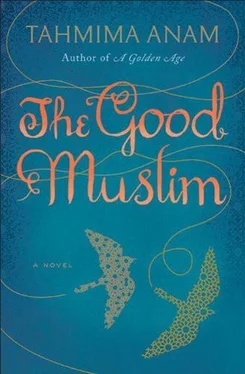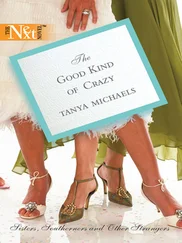Sohail sighed. His hand was heavy on her shoulder.
‘Did he tell you why he ran away?’
He shook his head. A weary, resigned shake. ‘The Huzoor said—’
‘It’s the Huzoor I want to talk to you about. There’s something going on, something not right — I saw Zaid, he didn’t look well. Ammoo was going into hospital that day, or I would have come to you.’ She was making excuses for herself. If only Zaid hadn’t arrived at that moment, if only she had taken him to the hospital with her. ‘The point is, you have to get him out of there,’ she said. ‘It’s not a safe place, not a place for children. That Huzoor is doing things, I don’t know exactly what, but the children have no defence against him. Do you understand what I’m saying?’
He turned away from her. Across the road, the rickshaw-wallah had curled up on the seat of his vehicle. The city sounds faded in and out, lorries labouring in the distance, the wheeze of carriages on the railway line. She reached for his hand, imagining the shock of it sinking slowly through him. When he turned around and spoke, his voice was cracked. ‘He lies, you know that. He lies all the time.’ A deep furrow between his eyes.
‘I know, but you can’t take the risk. Even if there’s a slight chance he’s telling the truth, you have to get him out of there. And I’m telling you, he didn’t look well. Rokeya said—’
‘You’ve seen Rokeya?’
‘I delivered her baby this morning.’
‘Sister Khadija was insulted by the way she left the jamaat.’ The evidence was getting shakier, less reliable.
‘The madrasa is not a good place, Bhaiya.’
‘You’re hardly objective.’ He was using both hands to smooth down his beard. The purple bruise on his forehead reflected the dying light. The devout believed that on the Day of Judgement, it would shine like a beacon, and she imagined it now, light pouring from his forehead, like a miner’s headlamp.
‘You’ll go tomorrow, then?’
He paused, pulling harder on his beard, taming the curl of it. ‘He is my son. I will ensure his safety.’
‘Promise me you’ll go tomorrow.’
‘I cannot promise you that.’
He could not mean what he appeared to be saying. He wouldn’t go, he wouldn’t rescue his son from whatever hellhole he had sent him to. ‘You want him to be just like you, is that it?’
Sohail took a step towards her, and he was close, very close, when he said, ‘I want, more than anything else, for him not to become like me. That is why I sent him away.’
It didn’t make any sense. She told him so. ‘You wouldn’t understand.’ He kissed her gently, missing her forehead, his lips landing on her eyebrow. She held herself stiffly, wondering what to do now. All this time she had been waiting for something noble to come out of him. At the hospital, she had had an inkling of it. He had gone to Ammoo’s bedside, he had recited the words. At the time she had thought this might be enough. But he had not believed her. He would not rescue his son.
By the time she got home, Ammoo was already asleep. Maya packed a small bag. A toothbrush, a change of clothes. Then, thinking of Rokeya’s sister, she climbed up on to the roof and quietly pulled a long black chador and a nikab from the washing line. She wrote a note and left it on Ammoo’s bedside table. ‘I need to go back to Rajshahi for a few days. A few things to collect.’
Before slipping out into the morning, the sky pink and amber, she dialled Joy’s number. ‘What’s the matter?’ he said, sleep thick in his voice. ‘Changed your mind?’
‘No.’
‘Good. We can elope, you know. Kazi offices all over the country. Slip them a few bucks and they’ll do it on the spot.’
She told him she was going to Rajshahi for a few days. ‘Let me come with you.’
‘No. But I need a favour.’
‘Anything.’
‘I want you to find someone for me. Someone I lost in the war.’
There was always this: the Jamuna River, even in its diminished winter state, beating powerfully against its banks. Although she had raced here, Maya paused now for a moment before boarding the ferry, savouring the loam and brown silt of it. Little, in this country, inspired awe, but this river, thick and dangerous, was a wonder.
The ferry was crowded on this Saturday morning. Maya took her seat on the lower deck. A blaze of the siren, and the ferry picked up speed, tilting like a rocking chair as it hit the Jamuna current.
She knew little about the madrasa apart from the few clues she had been able to piece together. Sohail had told her he was taking the boy to Chandpur, and Zaid had said the madrasa was on its own island in the middle of the river. She had looked on a map, and found three different Chandpurs. Only one was near a river. At dawn, before she departed, she had gone upstairs and questioned Khadija, who had told her nothing. You no longer visit us, she said.
Maya had allowed herself to be duped. All those afternoons she had spent, drunk on the possibility that there might be some other hand in her mother’s illness, a divine hand she could manoeuvre with the help of Khadija and the jamaat. How could she have been so foolish? She should never have allowed Sohail to take Zaid to the madrasa. Ammoo’s illness had clouded her judgement. And when Zaid had come to her, she had swatted him away. What kind of mother would she make? She couldn’t even see the thing that was right before her eyes.
The cabin was packed now, and thick with heat. Being inside was making her thirsty. She stepped on to the deck and leaned her arms against the railing, tiny droplets of water landing on her face.
She found a cold-drinks stall. A boy with a lungi hitched up around his thighs squatted in front of a tub of ice and soft drinks. ‘Coke, please,’ she said. He looked about twelve, strong arms protruding from a vest that used to be white. He pulled a bottle out of the tub, wiped it with a cloth and opened it against the battered wooden table in front of him.
She gave him five taka. He caught her eye and smiled so broadly, so hopefully, that she found herself asking him why he wasn’t in school.
He shrugged, still smiling.
‘Where do you live?’
‘On this ferry. The driver is my uncle.’
A large family approached the stall and ordered their drinks. ‘Three Mirindas and seven 7 Ups!’ the father shouted, thrilled by his own joke ‘And hurry, na.’ The boy rushed through the order, fishing the bottles out of the icy water, throwing in new ones from the crates stacked up alongside. Maya lingered, watching him work. The man took his drinks, throwing his money at the boy, dodging the thin, pointy straws as they bobbed in the open bottles.
‘Do you live in Dhaka?’ he asked her.
‘Yes,’ she replied. ‘I’m a doctor.’
He pushed out his lower lip and nodded, impressed. ‘Dakhtar.’
They were in the middle of the river now, the shores disappearing on either side. A muezzin announced the Asr prayer. The ferry slowed down, the engine coughing. Then it suddenly stopped, and everything was quiet; only the lapping of the water against the boat.
‘Sometimes the engine breaks,’ the boy said. They heard shouts coming from below, and the sound of running feet. There was no longer a breeze. Passengers crowded the walkways, squeezing themselves against the railing.
‘Come with me,’ the boy said. ‘I know a better place.’
‘Oh, it’s all right.’ Maya shook her head. ‘Really, it’s all right here. And you shouldn’t leave the stall; people will be wanting their drinks.’
He was already sliding the tub under the table and folding down the small cubicle. She followed him as he led her up a set of steps, then through the ferry and up a narrow ladder. He climbed up quickly, his bare feet curling around the metal rungs, then turned and held out his hand to Maya.
Читать дальше












